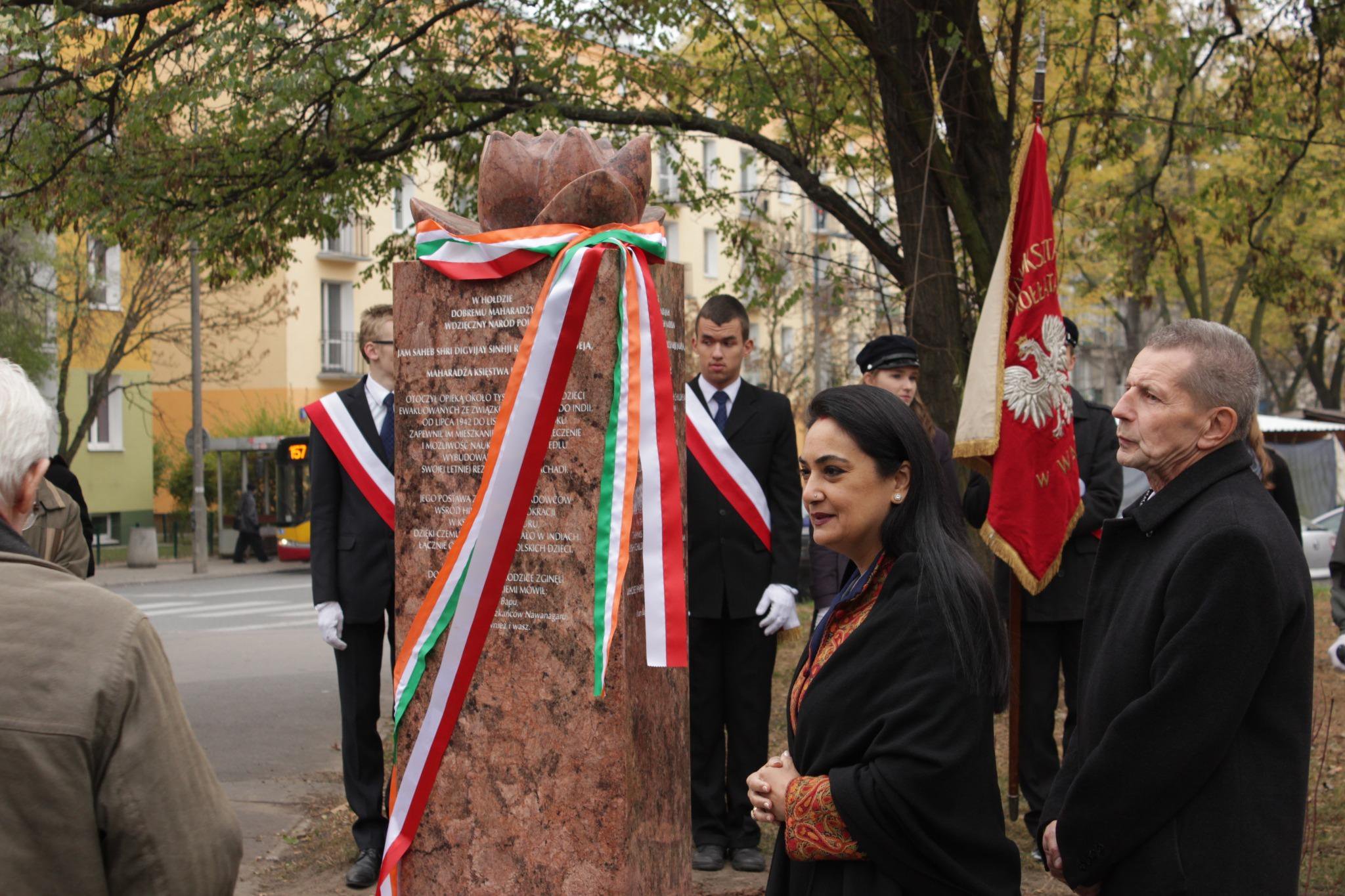


Indian Prime Minister Narendra Modi visited Warsaw, Poland, to pay homage at three memorials, including a monument of the 'Good Maharaja' who provided refuge to over 1,000 Polish children during World War II. Modi highlighted the importance of humanity and compassion in building a just and peaceful world. The event was also commemorated by the ministry of external affairs, with emphasis on the impact of the 'Good Maharaja' on India-Poland relations. The memorial monument was unveiled in 2014 and continues to have a lasting impact, with eight Polish schools named after the 'Good Maharaja'.
Warsaw: A Monument to Humanity and Compassion
During his visit to Warsaw, Poland, Indian Prime Minister Narendra Modi paid homage at three memorials, including the monument to the "Good Maharaja" of Nawanagar, Jam Sahib Digvijaysinhji Ranjitsinhji. The monument commemorates the Maharaja's humanitarian efforts in providing refuge to over 1,000 Polish children during World War II.
Background
In 1939, Poland was invaded by Nazi Germany, forcing thousands of Polish citizens to flee their homes. A group of Polish children, known as the "White Eagles," were among those who sought refuge in India.
The Maharaja of Nawanagar, a princely state in British India, stepped forward and offered hospitality to these children. He established a settlement for them in Balachadi, where they were cared for and educated for five years.
The children received shelter, food, clothing, and medical care. They were also taught the Gujarati language and immersed in Indian culture.
The Monument
In recognition of the Maharaja's humanitarian gesture, a monument was unveiled in Warsaw in 2014. The monument features a bronze statue of the Maharaja holding a Polish child in his arms.
The monument has become a symbol of the friendship between India and Poland and a reminder of the importance of compassion and humanity in times of conflict.
Impact
The Maharaja's actions had a profound impact on the lives of the Polish children. It is said that many of them went on to become successful individuals, including doctors, scientists, and engineers.
The monument has also strengthened India-Poland relations. It serves as a reminder of the shared history and values between the two countries.
Top 5 FAQs
1. Who was the "Good Maharaja"?
Jam Sahib Digvijaysinhji Ranjitsinhji, the Maharaja of Nawanagar.
2. How many Polish children did he shelter?
Over 1,000.
3. Where were the children sheltered?
In Balachadi, a settlement in Nawanagar.
4. Why did the children seek refuge in India?
Poland was invaded by Nazi Germany in 1939.
5. What is the significance of the monument?
It commemorates the Maharaja's humanitarian efforts and symbolizes the friendship between India and Poland.

Indian Prime Minister Narendra Modi declared that the year 2026 will be marked as the "ASEAN-India Year of Maritime Cooperation" during the 22nd ASEAN-India Summit. This announcement highlights India's growing alignment with the ASEAN bloc, with Modi emphasizing the importance of the partnership in terms of strategic and economic cooperation. The Summit's theme of "Inclusivity and Sustainability" also reflects the shared priorities of both India and ASEAN, with joint efforts in areas such as digital inclusion, food security, and resilient supply chains. In addition to strategic cooperation, Modi also highlighted the expansion of collaboration in other areas such as education, tourism, and cybersecurity, while acknowledging the new member Timor-Leste and extending condolences to Thailand. Looking ahead, Modi expressed confidence in the long-term vision of ASEAN and India's development goals, stating that the 21st century belongs to both India and ASEAN.

During his virtual address to the 22nd ASEAN-India Summit, Prime Minister Narendra Modi highlighted the shared cultural and historical ties between the two regions and stressed the importance of ASEAN in India's Act East Policy. He reaffirmed India's commitment to ASEAN centrality and hailed the ASEAN-India Comprehensive Strategic Partnership as a foundation for regional growth and global stability. With Malaysia as the current ASEAN chair and the Philippines set to take over in 2026, discussions at the upcoming East Asia Summit will focus on Indo-Pacific security and regional stability.

During their stay in Indore for the Women's Cricket World Cup, two Australian players were molested by Aqueel Khan, a known criminal with a history of offenses. The man was caught after an eyewitness noted down the number plate of his motorcycle, allowing the police to track him down through CCTV footage. The Australian team, who were staying at Radisson Blu Hotel in Indore, reacted strongly to the incident and filed a complaint with the police. The Madhya Pradesh Cricket Association has condemned the incident and offered support to the affected players.

The leaders of five European countries, including PM Keir Starmer and Ukrainian President Volodymyr Zelensky, gathered in London to address the ongoing war in Ukraine. Starmer declared that Russian President Vladimir Putin is not serious about pursuing peace, while Zelensky thanked the US for imposing new sanctions on Russia. Outside of the summit, Ukrainians shared their experiences and fears of living in a warzone.

India and the US are on the verge of finalizing a trade deal, with both sides making significant progress and ironing out most issues. Union Minister of Commerce and Industry, Piyush Goyal, clarified that India will not succumb to pressure and will only enter into a deal that is fair and beneficial for both countries. Furthermore, Goyal emphasized that India's approach is driven by a long-term vision, rather than momentary pressure or deadlines.

Delhi Police has arrested two ISIS operatives who planned to carry out blasts during Diwali celebrations in South Delhi. The suspects were reportedly radicalised online and had conducted recce of busy locations to inflict maximum casualties. Police believe the accused were in touch with foreign handlers and are looking into potential links to Pakistan's ISI. Investigations are ongoing to determine if the suspects have attempted to recruit others in Delhi and Bhopal.

In recognition of World Polio Day, Navi Mumbai joined the global effort to eradicate the paralyzing and vaccine-preventable disease by hosting an End Polio Now Laser Display. This initiative, organized by the Rotary Club of Navi Mumbai Joy of Giving, in collaboration with various organizations, aims to raise awareness and support for the cause. Despite significant progress, vigilance and continued commitment are still crucial to achieve a polio-free world.

The US and Australia have signed a deal to boost cooperation on rare earths and critical minerals, with the goal of reducing dependence on China. Australian Prime Minister Albanese has pledged to invest billions in crucial projects in the next six months as part of the agreement. Trump also emphasized the importance of the Aukus defense pact with Australia and the UK, stating that it serves as a deterrent against China. The deal is now moving forward quickly, with only minor clarifications left to be made.

Top US officials, including Vice President JD Vance and Secretary of State Marco Rubio, have spoken out against the Israeli parliament's vote to annex the already-occupied West Bank. Vance called the vote a "stupid political stunt" that could harm ongoing efforts towards a ceasefire and peace deal. Rubio warned that the move could jeopardize President Trump's plan to end the conflict. Despite the Knesset's approval, both officials reiterated that it is not the policy of the US to support annexation of the West Bank by Israel.

Pannir Selvam, a 28-year-old Malaysian man, received the death sentence in Singapore after being convicted of drug trafficking. Pannir's family, who remember him as a playful and talented musician, were shocked to hear of his arrest and have been fighting for his release ever since. With Singapore's strict laws against drug trafficking, Pannir's fate now lies in the hands of the court.